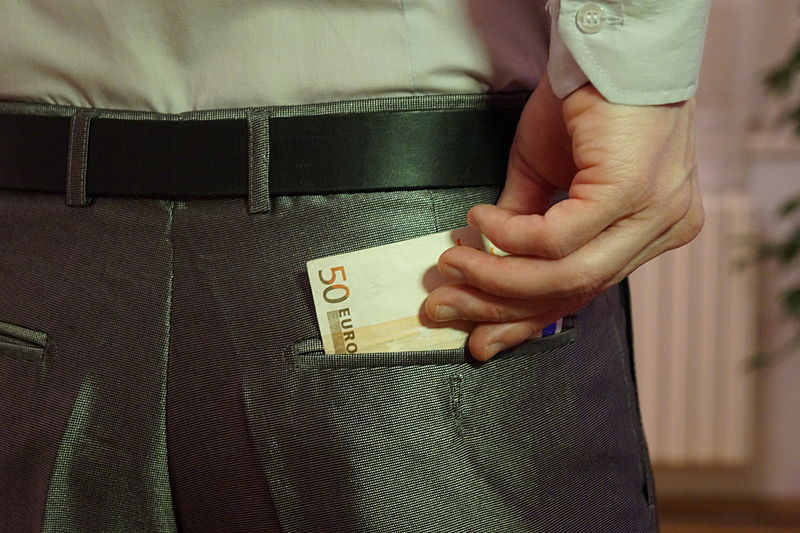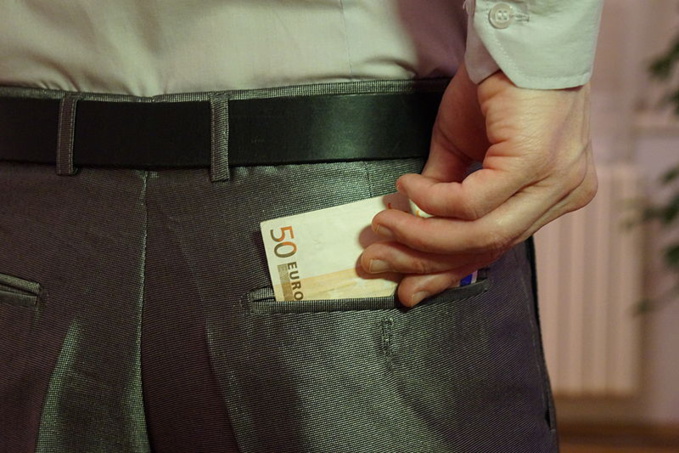Transparency International, headquartered in Berlin, conducted a survey of 60 thousand people in 42 countries of Europe and Central Asia.
Spaniards are among those Europeans who believe that corruption is a challenge. 66% of respondents in Spain said this, and they are sure that corruption is one of the biggest problems of the country. In Germany, only 2% gave a similar answer. Moldova, Kosovo, Slovenia and Hungary are among other European countries, where the population also sees a big problem connected to corruption.
Residents of Moldova and Ukraine also top the list of those who think that their politicians are corrupt. The percentage there is 76 and 64%, respectively. 86% of Ukrainians say that their government is losing fight against corruption; number of such respondents in Moldova is 84%.
30% respond do not report to officials on corruption as they are afraid of possible consequences. 14% believe that nobody talks about corruption since it is very difficult to collect evidence, and 12% simply keep silent, because, in their opinion, complaints are useless.
"Governments do nothing to fight corruption, because it is beneficial for those in power", - said Director of Transparency International Jose Ugas. "To stop this very sad development of relationship between the wealth, power and corruption, governments should seek a greater transparency", - he added.
The study also shows that one in six families last year gave passed money under the table to get access to public services. The most difficult situation is observed in the former Soviet republics, where this number amounts to 30%.
Residents of France and Portugal are the most intolerant of corruption. 74 and 78%, respectively, are willing to report on bribery facts.
Transparency International’s Global Corruption Barometer study examines public opinion on corruption and activities of the authorities to overcome the corruption abuses. The first study was carried out in 2003. In 2016, TNS research team conducted individual interviews using computer-assisted personal interviewing (CAPI). The survey involves adult citizens of all ages.
Earlier, the European Parliament decided to find out how expensive is corruption in Europe. MEPs were unpleasantly surprised by results of a study conducted by research and consulting organization Rand Europe. United Europe’s losses due to corruption amounted to 1.11 trillion dollars a year, or 6.3% of the European Union’s GDP. This huge figure is 8 times greater than losses, listed in other studies.
Corruption bears not only financial consequences. We should not forget about great losses in politics and social sphere. It leads to expansion of social inequality, increased number of crimes, weakening of the rule of law, and other undesirable consequences. Another very important consequence of corruption is indirect financial support of international terrorism.
"These figures confirm our long-term conclusions, - said Carl Dolan, Director of Transparency International EU. - Corruption is a huge black hole in the heart of the European economy, which hinders its recovery."
source: independent.co.uk, ap.org
Spaniards are among those Europeans who believe that corruption is a challenge. 66% of respondents in Spain said this, and they are sure that corruption is one of the biggest problems of the country. In Germany, only 2% gave a similar answer. Moldova, Kosovo, Slovenia and Hungary are among other European countries, where the population also sees a big problem connected to corruption.
Residents of Moldova and Ukraine also top the list of those who think that their politicians are corrupt. The percentage there is 76 and 64%, respectively. 86% of Ukrainians say that their government is losing fight against corruption; number of such respondents in Moldova is 84%.
30% respond do not report to officials on corruption as they are afraid of possible consequences. 14% believe that nobody talks about corruption since it is very difficult to collect evidence, and 12% simply keep silent, because, in their opinion, complaints are useless.
"Governments do nothing to fight corruption, because it is beneficial for those in power", - said Director of Transparency International Jose Ugas. "To stop this very sad development of relationship between the wealth, power and corruption, governments should seek a greater transparency", - he added.
The study also shows that one in six families last year gave passed money under the table to get access to public services. The most difficult situation is observed in the former Soviet republics, where this number amounts to 30%.
Residents of France and Portugal are the most intolerant of corruption. 74 and 78%, respectively, are willing to report on bribery facts.
Transparency International’s Global Corruption Barometer study examines public opinion on corruption and activities of the authorities to overcome the corruption abuses. The first study was carried out in 2003. In 2016, TNS research team conducted individual interviews using computer-assisted personal interviewing (CAPI). The survey involves adult citizens of all ages.
Earlier, the European Parliament decided to find out how expensive is corruption in Europe. MEPs were unpleasantly surprised by results of a study conducted by research and consulting organization Rand Europe. United Europe’s losses due to corruption amounted to 1.11 trillion dollars a year, or 6.3% of the European Union’s GDP. This huge figure is 8 times greater than losses, listed in other studies.
Corruption bears not only financial consequences. We should not forget about great losses in politics and social sphere. It leads to expansion of social inequality, increased number of crimes, weakening of the rule of law, and other undesirable consequences. Another very important consequence of corruption is indirect financial support of international terrorism.
"These figures confirm our long-term conclusions, - said Carl Dolan, Director of Transparency International EU. - Corruption is a huge black hole in the heart of the European economy, which hinders its recovery."
source: independent.co.uk, ap.org



















